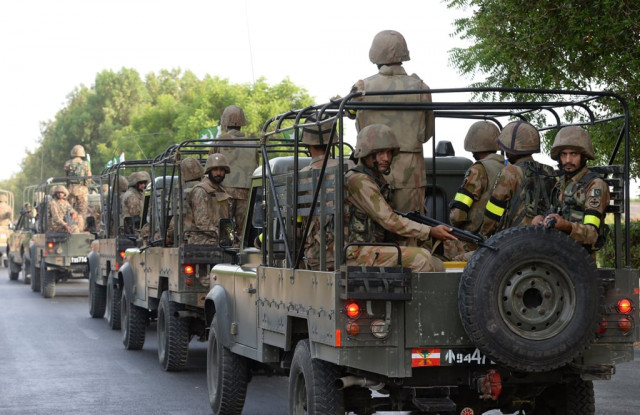Over 120 days on: 70% NAP agenda unfinished
Lack of political will of the top counter-terrorism body seen as major hurdle

A photo of Pakistan army. PHOTO: AFP
The National Action Plan (NAP) may have been drawn up a little over four months ago but its desired objectives still appear out of reach. A host of reasons are to be blamed: lack of political will, ineffectiveness of top counter-terrorism body and no legislation to rein in banned outfits.
Closed door interviews and meetings with officials monitoring implementation of targets set for the apex committees constituted by Prime Minister Nawaz Sharif on December 25, suggest that almost 70% agenda has still gone unaddressed.
Putting madrassa reforms on the backburner and differences among three key cabinet members, particularly between Prime Minister Nawaz Sharif and Interior Minister Chaudhry Nisar Ali Khan, remained two of the major stumbling blocks in executing the action plan which was formulated after the bloody December 16 Taliban attack on APS in Peshawar.

Well-placed officials said the interior ministry has not even briefed the PM Office over the execution plan of NAP since February 20, nor is he in contact with the premier due to certain unexplained reasons.
Performance of 15 committees
Officials revealed to The Express Tribune that Interior Minister Chaudhry Nisar, who was given charge of 11 committees, has yet to hold the maiden meetings of six committees.
Four apex committees are being headed by provincial chief ministers, a committee is being headed by Federal Minister for Information Pervaiz Rashid and an umbrella committee is being headed by the prime minister himself, they added.
Madrassa reforms
A committee given the task to curb religious persecution failed to make any headway. The interior minister could not hold even its second meeting despite passage of over three months, the officials said. This committee was assigned to devise the plan in three days, they added.
The interior ministry remained unable to resolve issues of madrassa reforms, a senior official of the ministry revealed.
“Jihadi groups are roaming freely,” Senator Rehman Malik remarked, counting it as one of several reasons why NAP has proved ineffective thus far. “We have yet to see any legislation to control proscribed organisations,” lamented Malik, who was member of the parliamentary committee which crafted the 20-point NAP.
Cyber terrorism and foreign funding
The well-informed officials continued to reveal that not even introductory meeting of committee overseeing terror on the internet and foreign financing to militants could be summoned by the interior minister, who developed differences with Finance Minister Ishaq Dar over release of funds for the establishment of National Counter Terrorism Authority (Nacta).

Committees formed to introduce reforms for the Federally Administered Tribal Areas (Fata) and resolve issues relating to IDPs return and Afghan refugees could not prepare productive recommendations so far, they added.
Armed militias and hate speeches
Meeting of the committee formed to keep check on the media not to glorify terrorists could be summoned by the ministry of interior. Likewise, it has yet to summon the first meeting of the committee formed to deal with the issue of armed militias, the officials said.
Similarly, the interior minister could not chair a joint meeting of the committee which was supposed to prepare recommendations on how to counter hate speech and extremist material, they added.
Apex bodies meetings
There seems to be no progress on reviving and reorganising the Nacta which consists of only six dozen officials, majority of them having no relevant experience, the officials said.
The committee formed to ensure deployment of a dedicated counter-terrorism force by May 31 this year could not finalise the process as the ministry of finance refused to release funds. Premier Sharif is yet to chair meetings of apex committees tasked with handling the law and order situation in Balochistan and Khyber-Pakhtunkhwa (K-P).
Former interior minister Aftab Ahmed Sherpao says it seems only the army is executing the plan as the top civilian body, Nacta, remained on paper only. Apex committees in Khyber-Pakhtunkhwa and Balochistan remained ineffective, he pointed out.
Provinces’ performance
Both Punjab and K-P, through swift legislation and an earnest crackdown against militants, are taking the lead over Sindh and Balochistan, which according to Hamid Khan showed poor progress when it comes to implementing the National Action Plan.
Published in The Express Tribune, April 27th, 2015.



















COMMENTS
Comments are moderated and generally will be posted if they are on-topic and not abusive.
For more information, please see our Comments FAQ